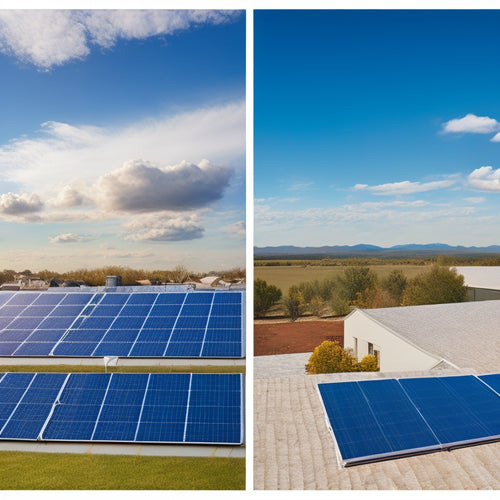
Top-Recommended Solar Panels for Single Family Homes
Share
You're likely considering solar panels for your single-family home, and with so many options available, it's crucial to focus on the top-recommended brands and models that offer a perfect blend of efficiency, durability, and affordability. Leading brands like SunPower, Panasonic, and Tesla provide extensive solutions, including installation, monitoring, and maintenance, ensuring reliable performance and extended warranties. With current efficiency rates ranging from 20% to 23%, you can maximize energy production while minimizing space and costs. To make an informed decision, evaluate factors like durability, weather resistance, installation costs, and warranty terms - and you'll be well on your way to utilizing the full potential of solar energy for your home.
Key Takeaways
- Leading brands like SunPower, Panasonic, and Tesla offer efficient energy harvesting, reliable performance, and dedicated customer support for single-family homes.
- Look for solar panels with high efficiency rates (20-23%) and advanced features like bifacial cells, multi-busbar designs, and half-cut cells for maximum energy production.
- Budget-friendly options are available, with average costs dropping over 60% in the last decade, and financing options like solar loans or power purchase agreements.
- Ensure durability and weather resistance by selecting panels with anodized aluminum frames, tempered glass, and weather-resistant coatings, and evaluating temperature coefficients and wind/snow load ratings.
- Prioritize warranties and customer support, with a focus on detailed warranties, 24/7 support, and online resources, to maximize energy savings and overall satisfaction.
Top Brands for Residential Use
Several top-tier brands dominate the residential solar panel market, offering high-efficiency modules and all-inclusive solutions for single-family homes.
You'll find familiar names like SunPower, Panasonic, and Tesla leading the charge. These industry giants provide all-encompassing solutions, including installation, monitoring, and maintenance, making it easier for you to shift to renewable energy.
By choosing a top-tier brand, you'll benefit from their extensive research and development, resulting in more efficient energy harvesting and reduced carbon footprints.
Investing in a reputable brand also guarantees you'll receive reliable performance, extended warranties, and dedicated customer support.
As you consider solar panels for your single-family home, prioritize brands that offer sustainability benefits, such as reduced greenhouse gas emissions and energy independence.
With a top-tier brand, you'll be well on your way to reducing your reliance on the grid and enjoying the financial benefits of clean energy.
Most Efficient Solar Panels
When selecting a solar panel for your single-family home, you'll want to maximize energy production while minimizing space and costs. To achieve this, you need to focus on the most efficient solar panels that can deliver the highest energy conversion rates.
Currently, the most efficient solar panels boast energy conversion rates ranging from 20% to 23%. These high-efficiency panels are made possible by advancements in solar panel technology, such as bifacial cells, multi-busbar designs, and half-cut cells.
These innovations enable solar panels to capture more sunlight and convert it into usable energy. For instance, bifacial cells can absorb light from both the front and back sides of the panel, increasing energy output by up to 25%. Similarly, multi-busbar designs reduce electrical resistance, allowing for more efficient energy flow.
Budget-Friendly Options Available
You're likely looking for solar panel options that fit your budget without compromising on performance.
Fortunately, low-cost solar energy solutions are now more accessible than ever, with affordable panel options available in the market.
Low-Cost Solar Energy
By now, homeowners have likely uncovered that solar panels are a viable option for reducing their carbon footprint and energy bills. As you consider making the switch, it's crucial to understand that low-cost solar energy is more accessible than ever.
Government incentives have played a significant role in driving down the cost of solar energy, making it a more competitive option with traditional fossil fuels.
Solar energy trends indicate a continued decline in costs, with the average cost of solar panels dropping by over 60% in the last decade. This downward trend is expected to continue, driven by advancements in technology and economies of scale.
As a homeowner, you can take advantage of these dropping costs to reduce your energy bills and carbon footprint. With solar panels, you can generate clean energy and reap the financial benefits of going green.
Affordable Panel Options
As the cost of solar energy continues to decline, homeowners are finding it increasingly feasible to invest in affordable panel options. You can now access budget-friendly solar panels that provide considerable energy savings without breaking the bank.
When examining affordable panel options, you'll want to regard the wattage output, efficiency rating, and durability of each panel. Look for panels with high-efficiency ratings (above 18%) and durable materials that can withstand harsh weather conditions.
Additionally, take advantage of installation incentives offered by local governments and utilities. These incentives can greatly reduce the upfront cost of solar panel installation, making it more accessible to homeowners on a budget.
You can also investigate financing options, such as solar loans or power purchase agreements, to spread the cost over time. By investing in affordable solar panels, you can start generating clean energy and enjoying long-term savings on your electricity bills.
Durability and Weather Resistance
The rugged exterior of solar panels is designed to withstand the harsh conditions of various climates, from scorching deserts to snowy mountains. You expect your solar panels to perform flawlessly for decades, and manufacturers have responded by engineering durable products that can withstand extreme temperatures, heavy rainfall, and intense sunlight.
Most solar panels are built with anodized aluminum frames, tempered glass, and weather-resistant coatings to guarantee long-term performance and minimize environmental impact.
When evaluating solar panels, look for products with IP67 or higher ratings, which assure protection against dust and water ingress. Additionally, check the panel's temperature coefficient, which measures its efficiency in high-temperature conditions. A lower temperature coefficient indicates better performance in hot climates.
You should also consider the panel's wind load and snow load ratings, which determine its ability to withstand harsh weather conditions. By choosing a durable and weather-resistant solar panel, you'll enjoy a reliable source of clean energy and minimize the need for costly repairs or replacements.
Installation and Maintenance Costs
Your solar panel system's installation and maintenance costs can greatly impact your overall investment, so it's vital to include them in your decision-making process. These costs can vary depending on factors such as system size, installation complexity, and local labor rates. On average, installation costs range from $2.50 to $3.50 per watt, with a typical residential system costing around $15,000 to $25,000.
To mitigate these costs, you can take advantage of local incentives and financing options. Many states and utilities offer rebates, tax credits, and low-interest loans to encourage solar adoption. Additionally, some solar panel manufacturers offer financing options or power purchase agreements that can help spread the cost over time.
When evaluating installation and maintenance costs, it's important to reflect on the long-term benefits of solar energy. With a typical system lifetime of 25 years or more, you can enjoy significant savings on your electricity bills and potentially increase your property value.
Compatibility With Roof Types
Because solar panels are installed on your roof, it's important to evaluate whether your roofing material is compatible with solar panels. The type of roof you have can greatly impact the performance and longevity of your solar panel system.
For instance, asphalt shingle roofs are the most common and compatible with solar panels, while metal roofs can be more challenging due to their unique design and installation requirements.
When determining compatibility, consider your roof's orientation, as south-facing roofs receive the most sunlight and are ideal for solar panels. However, east- and west-facing roofs can also work well, depending on the installation angles.
A professional installer will review your roof's condition, size, and shape to determine the best installation angle and guarantee a secure and efficient system.
Additionally, consider the weight and durability of your roofing material. Solar panels can add weight to your roof, so it's vital to confirm your roofing material can support the additional load.
Warranty and Customer Support
Look for a solar panel system backed by a detailed warranty that covers both the equipment and workmanship. This guarantees you're protected against defects, malfunctions, and installation errors. A thorough warranty provides peace of mind and protects your investment.
When evaluating warranty coverage, consider the following key aspects:
| Warranty Aspect | Typical Coverage |
|---|---|
| Equipment Warranty | 25 years or more |
| Workmanship Warranty | 10-20 years |
| Performance Guarantee | 25 years or more |
| Customer Support | 24/7 phone and email support |
| Warranty Transferability | Yes, with some restrictions |
You should also assess the customer service offered by the manufacturer and installer. Look for 24/7 phone and email support, as well as online resources and documentation. A responsive customer service team can resolve issues quickly, minimizing downtime and guaranteeing your system operates at peak levels. By prioritizing warranty coverage and customer service, you'll enjoy a hassle-free solar panel experience and maximize your energy savings.
Frequently Asked Questions
Can I Install Solar Panels on a Rented Property?
As you gaze up at the rented roof, envisioning a sustainable future, you wonder if solar panels can be yours to utilize. Unfortunately, without ownership, you'll need your landlord's consent or investigate solar leases, ensuring you understand tenant rights to avoid any contractual disputes.
Do Solar Panels Increase Property Value?
You're likely to see a significant increase in property value when you make a solar investment, as it translates to substantial energy savings, increasing your home's appeal and potentially adding thousands to its resale value.
Can I Use Solar Panels for My Pool or Hot Tub?
Are you tired of high electricity bills for your pool or hot tub? You can utilize the sun's energy with a solar pool or hot tub system, reducing your energy costs and increasing your savings - it's a no-brainer!
Are Solar Panels Noisy During Operation?
You'll be glad to know that solar panels are virtually silent during operation, with most modern designs prioritizing solar panel efficiency and minimal maintenance, ensuring a quiet, hassle-free experience that lets you enjoy the power you're generating.
Can I Monitor My Solar Panel System Remotely?
Did you know 70% of solar owners want real-time monitoring? You can track your solar performance remotely, receiving instant updates on energy production, consumption, and system health, ensuring your system runs at peak efficiency, and maximizing your energy independence.
Related Posts
-

Solar Panel System Certification Costs: A 10-Point Breakdown
You're looking to understand the costs associated with solar panel system certification. Your total certification cos...
-

Charging Station Incentives: Why So Many Are Free
You're likely to stumble upon free or low-cost charging stations due to a convergence of incentives. Government rebat...
-

Tracking Solar Panels Vs Fixed Panels Cost Savings
When considering solar panel options, you'll want to weigh the cost savings of tracking solar panels versus fixed pan...


